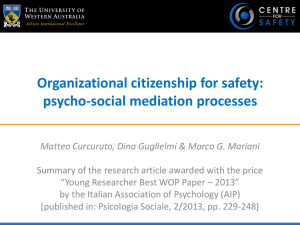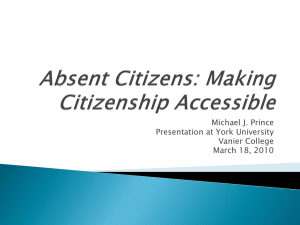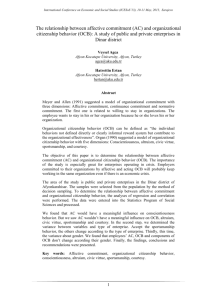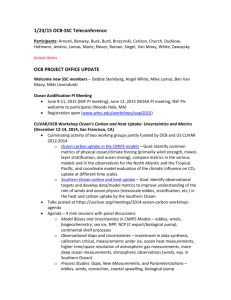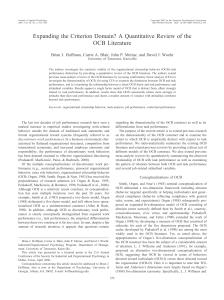Islamic Work Ethics and Organizational Citizenship Behavior
advertisement
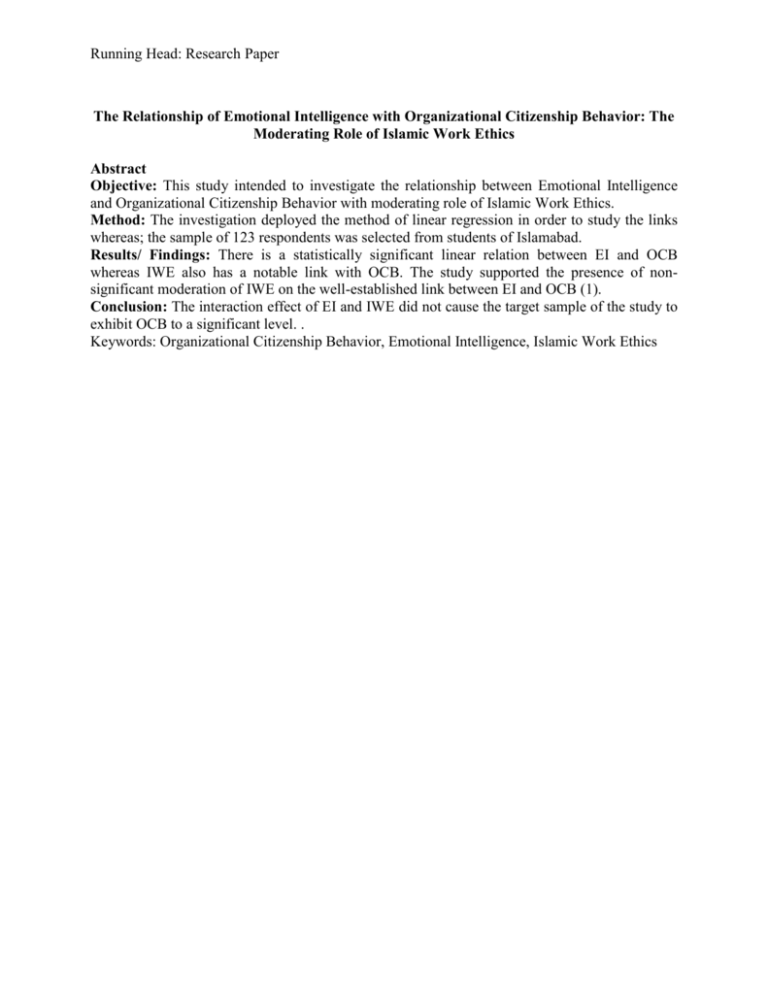
Running Head: Research Paper The Relationship of Emotional Intelligence with Organizational Citizenship Behavior: The Moderating Role of Islamic Work Ethics Abstract Objective: This study intended to investigate the relationship between Emotional Intelligence and Organizational Citizenship Behavior with moderating role of Islamic Work Ethics. Method: The investigation deployed the method of linear regression in order to study the links whereas; the sample of 123 respondents was selected from students of Islamabad. Results/ Findings: There is a statistically significant linear relation between EI and OCB whereas IWE also has a notable link with OCB. The study supported the presence of nonsignificant moderation of IWE on the well-established link between EI and OCB (1). Conclusion: The interaction effect of EI and IWE did not cause the target sample of the study to exhibit OCB to a significant level. . Keywords: Organizational Citizenship Behavior, Emotional Intelligence, Islamic Work Ethics Research Paper Introduction The Emotional intelligence is recognized as an effective and efficient tool to prolong one’s existence and tenure in an organization because it helps oneself in building social relations and respect amongst the employees in a particular organization (2). The prolongation of tenure increases employee commitment towards the organization and therefore, they want to do something extra for their workplace in order to express their attachment. Nevertheless, in collective culture, employees are famous for serving the organizations for longer period (3) and because of this reason, it is inferred that there is viable link between the constructs of EI and OCB in a featured cultural setting (4). However, the Islamic followers take their work, as worship and therefore, they tend to perform their duties in the light of religious values (5). The main contribution of this study is stemming from considering the role of Islamic Work Ethics in a moderating variable for the wellestablished relationship between Emotional Intelligence and Organizational Citizenship Behavior (6). The organizational managers should be helped in understanding the role of Islamic Work Ethics in strengthening Organizational Citizenship Behavior and in this way; the managers can acquire more services against the same compensation from the Muslim workers, who constitute major and notable percentage of the entire global workforce. Literature Review Following is the description of key relationships of the study: Emotional Intelligence and Organizational Citizenship Behavior The EI is believed to be the ability of a person that allows him or her to identify his or her own emotional state and along with this, it allows him or her to effectively judge the others’ cardinal state as well. However, the people with higher level of EI are known to use the emotional state of others to their advantage or meet certain goals and their ability to develop long-term communal relationships is considered important. Additionally, the people who are emotionally intelligent have been known to have the ability to work towards organizational and personal goals with vigor. The most difficult phase of practicing EI is to delay the original emotional responses to the situation and manifest an entirely different and socially acceptable reaction (7). OCB is defined as a set of voluntary activities that an employee or a group of employees is performing in order to better the organizational work climate. These activities are not part of the formal duties of the participants and neither are they considered in the process of employee evaluation (8). OCB is often fostered in staff when they receive good level of institutional responsiveness from administration and have sufficient opportunities to achieve their career goals (9). The dimensions of OCB are believed to be supportive attitude, ethical responsibility, and self-initiation. The OCB literature suggests that the construct is the result of individual’s dedication towards an organization (10) and therefore, he or she works towards betterment of organizational work climate. Moreover, the employees involved in OCB are rather responding to supervisor’s good behavior or attached to the image of organization to an extent where they consider working for the betterment of the company as their ethical duty. Attachment theory describes that workers 1 Research Paper have a profound tendency of sharing their problems and issues with people who possess significant and notable level of ability to care for others (11). The middle and operational managers are primarily and informally responsible for resolving issues on the workplace (12). The Social Exchange Theory helps in identification of peers as the best solvers of workforce related issues as their exposure and knowledge about work conditions is better than both middle and top managerial levels. Based on the above argument, it can be established that OCB is more abundantly prevalent amongst horizontal levels of the organization due to strong social relations amongst peers. Socially active people are anticipated a great deal to render help for their colleagues in difficult times. The associative behaviors are neither recognized nor rewarded by the institutions in major number of cases in the corporate sector of Pakistan and therefore, the positive and social relations can render great help in terms of applying the notion of Organizational Citizenship Behavior as it involves helping colleagues against no apparent benefit (13). HA1: There is a statistically significant relationship between Emotional Intelligence and Organizational Citizenship Behavior Islamic Work Ethics and Organizational Citizenship Behavior Islamic Work Ethics is a construct that is developed in order to incorporate religious ethical values in one’s professional life. Islam promotes professional engagement so that an individual can become an active and supportive participant of the society. Islamic cultures work significantly towards building a society and community and the societal relationships are established with the help of corporation and collaboration. In modern perspective, an organization is a social construct and therefore, it can thrive based on building synergetic relationships. However, Islamic philosophy is of the view that helping others in positive professional endeavors is nobility and it will be rewarded in the afterlife (14). Islamic Ethics in general promote selfless service to the society and as organizations can be taken as communities of a smaller scale, then Organizational Citizenship Behavior can be used as a means of applying Islamic values on the workplace and there is a sustainable statistical link between the featured constructs (15) as well. HB1: There is a statistically significant relationship between Islamic Work Ethics and Organizational Citizenship Behavior Emotional Intelligence, Islamic Work Ethics and Organizational Citizenship Behavior The construct of OCB cannot be applied without strong social and communal relations with the organization’s employees because the construct gives substantial amount of value to OCB practitioner’s ability to solve problems and help troubled colleagues and all of the activities cannot be performed in absence of social relations (16).. Thusly, there is a logical and scientific need to study the moderation effect of Islamic Work Ethics on previously established link between EI and OCB. The moderation influence should be empirically tested because Muslim workers have profound psychological need to practically apply religious practices in their professional lives and therefore, it is yet to be seen that the abovementioned need is compelling them to serve their organizations without receiving compensation in exchange. HC1: There is a statistically significant moderation effect of Islamic Work Ethics on the relationship of Emotional Intelligence and Organizational Citizenship Behavior Methodology 2 Research Paper Sampling technique and population This study has used the technique of convenient sampling in order to draw a sample from the target population that consist the students of universities in Islamabad. The sample was finally drawn from a private university located in the city where 150 questionnaires were distributed among the students of the institution whereas, 123 completely filled instruments were collected (123/150 = 0.82). The participation of the respondents was voluntary. Instruments and Cornbach Alphas Three instruments were deployed and all of them were measured on a five point Likert scale. The questionnaires developed by Rahim, Psenicka, Polychroniou, and Jing-Hua, (2002), Bukhari and Ali, (2009) and Ali, (2005) were used to measure Emotional Intelligence, Organizational Citizenship Behavior and Islamic Work Ethics whereas, the number of items were 22 (α = 0.841), 9 (α = 0.78) and 17 (α = 0.810) respectively. Following are the sample items from all three instruments in the sequence of mentioning: “I am well aware of my emotional state” “I showed genuine concern and courtesy toward coworkers, even under the most trying business or personal situations” “Dedication to work is virtue” Insert Table i here Control Variables This study treated age and qualification as control variables Data Analysis and Results Following are the summary of results of staistical tests that were run on the data collected during the investigation: Insert Table ii here Based on the above figures it can be established that there are significant positive linear relationships among Emotional Intelligence and Organizational Citizenship Behavior and therefore, the HA1 is assumed to be correct. The EI explained 29.2 % variance in the dependent variable (Carmeli & Josman, 2006). Furthermore, the construct of Islamic Work Ethics also successfully predicted the OCB as an outcome because it explained 54% of the variance in the dependent variable and in the light of presented evidence, the statement of HB1 is also accepted. The interaction effect of both the independent variables however, falied to influence the outcome in a significant manner. Insert Table iii here All of the independent variables had a significant relation with the dependent one based on the abovementioned values of correlation coefficients. Discussion and Conclusion The empirical evidence presented in the preceding parts of the study revealed the fact that OCB and EI are going to determine a significant level of OCB in the individual capacities whereas, the moderation role of IWE has been proven insignificant. Therefore, the promotion of IWE is not going to help the managers in promoting OCB in the target population. Secondly, supporting EI in educational organizations will help them in cultivating OCB in students of the featured locality. IWE on the other hand, enhance OCB as the environment of collaboration is created that is the essence of Islamic teachings. The idea of considering organization as a smaller version of the society is playing a significant and notable role in promoting OCB as well. 3 Research Paper Implications for Managers The failure of IWE in terms of influencing the relationship of EI and OCB means that managers cannot expect the Muslim individuals to engage in OCB on their own. The managers are needed to modify their behaviors and offer monetary and nonmonetary benefits to the employees in order to enhance their attachment to the organization that will help them in demonstrating OCB. Limitations The study is conducted in one educational institution of the country and therefore, its findings are applicable on the particular society. Additionally, the generalized interpretations cannot be developed for the entire Muslim world. Furthermore, all the respondents who participated in the study were Muslims and that is why, the results of the investigation should only be used to predict relevant behaviors in the target population only. Directions for Future Research The area of IWE is neglected in the modern managerial literature and because of this reason, it is strongly recommended to study the construct as an independent variable in relation to Organizational and Job commitment and Organizational Citizenship Behavior with moderating role of Management Leadership Style. The suggestion is made because managerial and supervisory behaviors are known to influence the OCB a great deal (17). References 1. The Relationship Among Emotional Intelligence, Task Performance, and Organizational Citizenship Behaviors. Carmeli, A and Josman, Z. 2006, Human Performance Vol 19 (4), pp. pp.403-419. 2. Relationship between Emotional Intelligence and Employees Turnover Rate in FMCG Organizations. Siddiqui, S and Hassan, A. 2013, Pakistan Journal of Commerce and Social Sciences Vol 7 (1), pp. pp.198-208. 3. Individualism-collectivism as an individual difference predictor of organizational citizenship behavior. Moorman, R and Blakely, G. 1995, Journal of Organizational Behavior Vol 16 (2), pp. pp.127–142,. 4. Moderating Effect of Impression Management On the Relationship of Emotional Intelligence and Organizational Citizenship Behavior. Jain, A. 2012, Journal of Behavioral and Applied Management Vol 13 no.2, pp. 86-107. 5. Bringing Work Back in Islamic Ethics. Taufiq, P, hafar, I and Shahimi, S. 2013, Journal of Business Ethics Vol 112 (2), pp. pp.257-270. 6. An Analysis of Correlation between Organizational Citizenship Behavior (OCB) and Emotional Intelligence (EI). Yaghoubi, E, Mashinchi, Mashinchi, S and Hadi, A. 2011, Modern Applied Science Vol 5 (2), pp. pp.119-123. 4 Research Paper 7. Emotional Intelligence as A Factor in Work Related Outcomes –A Study Among The Paramedical Staff at SRM Medical College, Kattankulathur, Chennai. Choudary, Y. 2010, Journal of Contemporary Research Vol 6 (1), pp. pp.121-136. 8. Organizational citizenship behavior in school How does it relate to participation in decision making? Bogler, R and Somech, A. 2005, Journal of Educational Administration Vol 43 (5) , pp. pp. 420-438. 9. Faculty Organizational Commitment and Citizenship. Lawrence, J, Ott, M and Bell, A. 2012, Res High Educ Vol 53 (1), pp. pp.325–352. 10. The components and determinants of preschool teacher organisational citizenship behaviour. Oplatka, I and Stundi, M. 2011, International Journal of Educational Management Vol 25 (3), pp. pp. 223-236. 11. Attachment Theory. Franzblau, S. 1999, Feminism & Psychology Vol 9(5), pp. pp.5-9. 12. A meta-analytical review of the relationship between emotional intelligence and leaders' constructive conflict management. Schlaerth, A, Ensari, N and Christian, J. 2013, Group Processes Intergroup Relations Vol 16(1), pp. pp.126-136. 13. A Test of Basic Assumptions of Affective Events Theory (AET) in Call Centre Work. Wegge, J, et al. 2006, British Journal of Management, 17, pp. 237–254. 14. Scaling an Islamic Work Ethic. Ali, A. 1988, The Journal of Social Psychology Vol 128 (5), pp. pp.575-583. 15. Islamic Work Ethics in Contemporary era and its relationship with Organizational Citizenship Behavior (A study based on public sector hospitals and banks in Pakistan). Zaman, M, et al. 2012, Interdisciplinary Journal of Contemporary Research in Business Vol 4 (6) , pp. pp.772-779. 16. A prosocial self-concept approach to understanding organizational citizenship behavior. Mayfield, C and Taber, T. 2010, Journal of Managerial Psychology Vol. 25 (7), pp. pp. 741763. 17. Transformational Leader Behaviors and Substitutes for Leadership as Determinants of Employee Satisfaction, Commitment, Trust, and Organizational Citizenship Behaviors. Podsakoff, P, MacKenzie, S and Bommer, W. 1996, Journal of Management Vol 22 (2), pp. 259-298. 18. The location of trait emotional intelligence in personality factor space. Petrides, K, Pita, R and Kokkinaki, F. 2007, British Journal of Psychology Vol 98 (1), pp. pp.273–289. 19. Emotions and leadership: The role of emotional intelligence. George, J. 2000, Human Relations Vol 53 (8), pp. pp.1027-1054. 20. A model of emotional intelligence and conflict management strategies A study in Seven Countries. Rahim, M, et al. 2002, International Journal of Organizational Analysis Vol 10 (4), pp. pp.302-326. 5 Research Paper 6 21. The deviant citizen: Measuring potential positive relations between counterproductive work behaviour and organizational citizenship behaviour. Suzy, F, et al. 2012, Journal of Occupational & Organizational Psychology Vol 85 (1), pp. pp.199-220. 22. Relationship between organizational citizenship behavior and counterproductive work behavior in the geographical context of Pakistan . Bukhari, Z and Ali, U. 2009, International Journal of Business and Management Vol 4 (1), pp. pp.85-92. 23. The Islamic Work Ethic in Arabia . Ali, A. 2005, The Journal of Psychology Vol 126 (5), pp. pp.507-519. Table i Demographics of the sample Characteristics Male ( n=82) n (%) Age 24 (29.3) 20-25 27 (32.9) 25-30 8 (9.8) 30-35 20 (24.4) 35-40 3 (3.7) Above Qualification 4 (4.9) Graduate 15 (18.3) Masters 31 (37.8) MS 21 (25.6) PhD 11 (13.4) Post-Doc Females (n=41) n (%) Total (n =123) 10 (24.4) 18 (43.9) 1 (2.4) 7 (17.1) 5 (12.2) 34 (27.6) 45 (36.6) 9 (7.3) 27 (21.9) 8 (6.5) 3 (7.3) 8 (19.5) 12 (29.3) 10 (24.4) 8 (19.5) 7 (5.7) 23 (18.7) 43 (34.9) 31 (25.2) 19 (15.4) Research Paper 7 Table ii Regression Analysis with OCB as an outcome Predictors B R2 Change in R2 Sig. S1 Control Variables 0.056 S2 EI 0.292*** 0.314 0.258 .000 IWE 0.559*** 0.540 0.226 .000 -0.104 (n.s) 0.545 0.005 S3 IWE*EI Note: R2 = Explained Variance B= unstandardized Coefficient *p<.05. **p< .01. ***p< .001. Table iii Correlations MeanOCB MeanEI MeanOCB Pearson Correlation 1 .494** Sig. (2-tailed) .000 N 123 123 MeanIW .694** .000 123 EIxIW .689** .000 123
